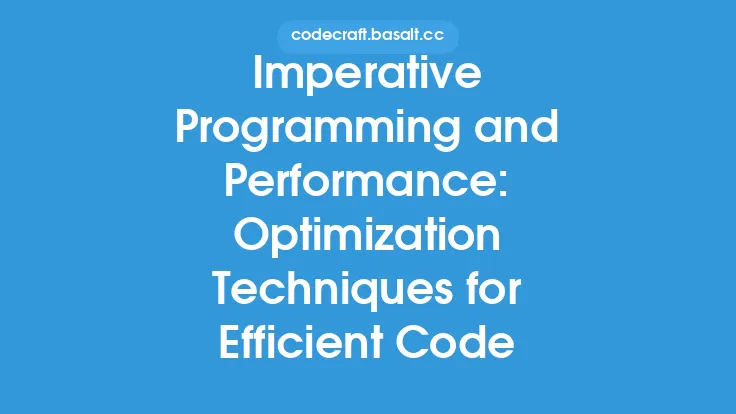When it comes to functional programming, the focus is often on the elegance and expressiveness of the code, rather than its performance. However, as functional programming becomes more mainstream, the need to optimize functional code for performance has become increasingly important. In this article, we will explore the performance considerations and best practices for optimizing functional code.
Performance Considerations
Functional programming languages and paradigms often introduce overhead that can impact performance. Some of the key performance considerations include:
- Immutable data structures: While immutable data structures provide many benefits, such as thread safety and easier debugging, they can also introduce overhead due to the need to create new copies of data.
- Function calls: Functional programming often involves many small function calls, which can lead to overhead due to the creation and destruction of stack frames.
- Recursion: Recursion can be an elegant way to solve problems, but it can also lead to stack overflow errors and performance issues if not implemented carefully.
- Higher-order functions: Higher-order functions, which take other functions as arguments or return functions as output, can introduce overhead due to the need to create and manage function objects.
Best Practices for Optimization
While functional programming languages and paradigms can introduce overhead, there are many best practices that can help optimize functional code for performance. Some of these best practices include:
- Using memoization: Memoization involves caching the results of expensive function calls so that they can be reused instead of recalculated. This can be particularly effective for pure functions, which always return the same output given the same inputs.
- Using lazy evaluation: Lazy evaluation involves delaying the evaluation of expressions until their values are actually needed. This can help avoid unnecessary computations and reduce overhead.
- Avoiding unnecessary allocations: Functional programming often involves creating and destroying many small objects, which can lead to overhead due to garbage collection. Avoiding unnecessary allocations can help reduce this overhead.
- Using efficient data structures: Choosing the right data structures can have a big impact on performance. For example, using arrays or vectors instead of linked lists can provide faster iteration and lookup times.
- Minimizing function calls: Minimizing the number of function calls can help reduce overhead due to stack frame creation and destruction. This can involve inlining small functions or using loop unrolling to reduce the number of iterations.
Loop Unrolling and Fusion
Loop unrolling and fusion are two techniques that can help optimize functional code by reducing the number of function calls and iterations. Loop unrolling involves increasing the number of iterations in a loop to reduce the number of function calls, while loop fusion involves combining multiple loops into a single loop to reduce overhead.
- Loop unrolling: Loop unrolling can be an effective way to reduce the number of function calls and improve performance. For example, instead of using a recursive function to iterate over a list, a loop can be unrolled to reduce the number of function calls.
- Loop fusion: Loop fusion can also be an effective way to improve performance by reducing the number of iterations and function calls. For example, instead of using separate loops to iterate over multiple lists, a single loop can be used to fuse the iterations together.
Compiler Optimizations
Many functional programming languages and compilers provide optimizations that can help improve performance. Some of these optimizations include:
- Inlining: Inlining involves replacing function calls with the actual code of the function, which can help reduce overhead due to stack frame creation and destruction.
- Specialization: Specialization involves creating specialized versions of functions for specific input types, which can help improve performance by reducing the number of function calls and iterations.
- Dead code elimination: Dead code elimination involves removing code that is never executed, which can help reduce overhead and improve performance.
- Common subexpression elimination: Common subexpression elimination involves removing duplicate computations by caching the results of expensive expressions, which can help improve performance by reducing the number of computations.
Garbage Collection and Memory Management
Garbage collection and memory management are critical components of functional programming languages and paradigms. Garbage collection involves automatically managing memory and removing unused objects, which can help reduce overhead and improve performance. Some of the best practices for garbage collection and memory management include:
- Using generational garbage collection: Generational garbage collection involves dividing objects into generations based on their lifetime, which can help improve performance by reducing the number of garbage collections.
- Using incremental garbage collection: Incremental garbage collection involves breaking up garbage collection into smaller increments, which can help improve performance by reducing pause times.
- Avoiding finalizers: Finalizers involve running code when an object is garbage collected, which can introduce overhead and reduce performance. Avoiding finalizers can help improve performance by reducing the number of garbage collections.
Conclusion
Optimizing functional code for performance requires a deep understanding of the performance considerations and best practices involved. By using techniques such as memoization, lazy evaluation, and loop unrolling, developers can help improve the performance of functional code. Additionally, compiler optimizations and garbage collection can also play a critical role in improving performance. By following these best practices and understanding the performance considerations involved, developers can write high-performance functional code that is both elegant and efficient.





